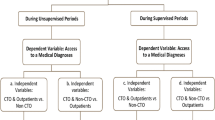Abstract
Issues affecting the research of outcomes of involuntary outpatient commitment (OC) of persons with serious mental illness are explored. These issues include the reliance on hospital recidivism as a primary measure of outcome, the role of family members and coercion in the process of outpatient commitment, and the conceptualization and design of studies. A conceptual framework that attempts to incorporate responses to these issues is proposed. Continued research on OC should build on conceptual models that include family, role and burden, services delivered, an accounting for varied coercive mechanisms, and client-level outcomes. Rehospitalization should be conceptualized as an intermediate variable between OC and client-level outcomes rather than as an ultimate outcome.
Similar content being viewed by others
References
Isaac RJ, Armat VC:Madness in the Streets: How Psychiatry and the Law Abandoned the Mentally Ill. New York: Free Press, 1990.
Drake RE, Burns BJ: Special section on assertive community treatment: An introduction.Psychiatric Services 1995; 46:667–668.
Geller JL: A biopsychosocial rationale for coerced community treatment in the management of schizophrenia.Psychiatric Quarterly 1995; 66:219–235.
Miller RD: Outpatient civil commitment of the mentally ill: An overview and an update.Behavioral Sciences and the Law 1988; 6:99–118.
Mulvey EP, Geller JL, Roth LH: The promise and peril of involuntary outpatient commitment.American Psychologist 1987; 42:517–584.
Torrey EF, Kaplan RJ: A national survey of the use of outpatient commitment.Psychiatric Services 1995; 46:778–784.
Maloy KA: Does involuntary outpatient commitment work? In: Sales B, Shah S (Eds.):Mental Health and Law: Research, Policy, and Services, Durham, NC: Carolina Academic Press, 1996, pp. 41–74.
Berg JW, Bonnie RJ: When push comes to shove: Aggressive community treatment and the law. In: Dennis D, Monahan J (Eds.):Coercion and Aggressive Community Treatment. New York: Plenum Press, 1996, pp. 172–197.
Hiday VA: Outpatient commitment: Official, coercion in the community. In: Dennis D, Monahan J (Eds.):Coercion and Aggressive Community Treatment. New York: Plenum Press, 1996, pp. 33–52.
Swartz MS, Burns BJ, Hiday VA, et al.: New directions in research on involuntary outpatient commitment.Psychiatric Services 1995; 46:381–385.
Solomon P: Research on the coercion of persons with severe mental illness. In: Dennis D, Monahan J (Eds.):Coercion and Aggressive Community Treatment. New York: Plenum Press, 1996, pp. 129–147.
Geller JL: Rights, wrongs, and the dilemma of coerced community treatment.American Journal of Psychiatry 1986; 143:1259–1264.
Bursten B: Post hospital mandatory outpatient treatment.American Journal of Psychiatry 1986; 143:1255–1258.
Hiday VA, Goodman RR: The least restrictive alternative to involuntary hospitalization, outpatient commitment: Its use and effectiveness.Journal of Psychiatry and Law 1982; 10:81–96.
Miller RD, Fiddleman P: Outpatient commitment: Treatment in the least restrictive environment?Hospital and Community Psychiatry 1984; 35:147–151.
Klinkenberg WD, Calsyn RJ: Predictors of receipt of aftercare and recidivism among persons with severe mental illness: A review.Psychiatric Services 1996; 47:487–496.
Draine J, Solomon P: Jail recidivism and the intensity of case management services among homeless persons with mental illness leaving jail.Journal of Psychiatry and Law 1994; 22:245–261.
Tonry M: Stated and latent functions of ISP.Crime & Delinquency 1990; 36:174–191.
Lovell AM: Coercion and social control: A framework for research on aggressive strategies in community mental health. In: Dennis D, Monahan J (Eds.):Coercion and Aggressive Community Treatment. New York: Plenum Press, 1996, pp. 148–171.
Solomon P, Doll W: The varieties of readmission: The case against the use of recidivism rates as a measure of program effectiveness.American Journal of Orthopsychiatry 1979; 49:230–239.
Estroff S, Zimmer C, Lachicotte WS, et al.: The influence of social networks and social support on violence by persons with serious mental illness.Hospital and Community Psychiatry 1994; 45:669–679.
Cook J: Who “mothers” the chronically mentally ill?Family Relations 1988; 37:42–49.
Goldman HH: Mental illness and family burden: A public health perspective.Hospital and Community Psychiatry 1982; 33:557–560.
Lefley H: Aging parents as caregivers of mentally ill adult children: An emerging social problem.Hospital and Community Psychiatry 1987; 38:1063–1070.
Hiday VA: Coercion in civil commitment: Process, preferences, and outcome.International Journal of Law and Psychiatry 1992; 15:359–377.
Brown SJ: Outpatient commitment being revisited: First randomized, controlled studies.Clinical Psychiatry News 1996; 24(3):5.
Van Putten RA, Santiago JM, Berren MR: Involuntary outpatient commitment in Arizona: A retrospective study.Hospital and Community Psychiatry 1988; 39:953–958.
Zanni G, de Veau L: Inpatient stays before and after outpatient commitment.Hospital and Community Psychiatry 1986; 37:941–942.
Greeman M, McClellan TA: The impact of a more stringent commitment code in Minnesota.Hospital and Community Psychiatry 1985; 36:990–992.
Fernandez G, Nygard S: Impact of involuntary outpatient commitment on the revolving door syndrome in North Carolina.Hospital and Community Psychiatry 1990; 41:1001–1004.
Hiday VA, Scheid-Cook TL: The North Carolina experience with outpatient commitment.International Journal of Law and Psychiatry 1987; 10:215–232.
Hiday VA, Schied-Cook TL: A follow-up of chronic patients committed to outpatient treatment.Hospital and Community Psychiatry 1989; 40:52–58.
Hiday VA, Scheid-Cook TL: Outpatient commitment for revolving door patients: Compliance and treatment.Journal of Nervous and Mental Disease 1991; 179:85–90.
Reynolds AJ, Temple JA: Quasi-experimental estimates of the effects of a preschool intervention.Evaluation Review 1995; 19:347–373.
Solomon P, Draine J, Mannion E, et al.: Impact of individualized consultation and group workshop family education interventions on ill relative outcomes.Journal of Nervous and Mental Disease 1996; 184:252–254.
Susser E, Roche B: “Coercion” and leverage in clinical outreach. In: Dennis D, Monahan J (Eds.):Coercion and Aggressive Community Treatment. New York: Plenum Press, 1996, pp. 74–86.
Author information
Authors and Affiliations
Rights and permissions
About this article
Cite this article
Draine, J. Conceptualizing services research on outpatient commitment. The Journal of Mental Health Administration 24, 306–315 (1997). https://doi.org/10.1007/BF02832664
Issue Date:
DOI: https://doi.org/10.1007/BF02832664



